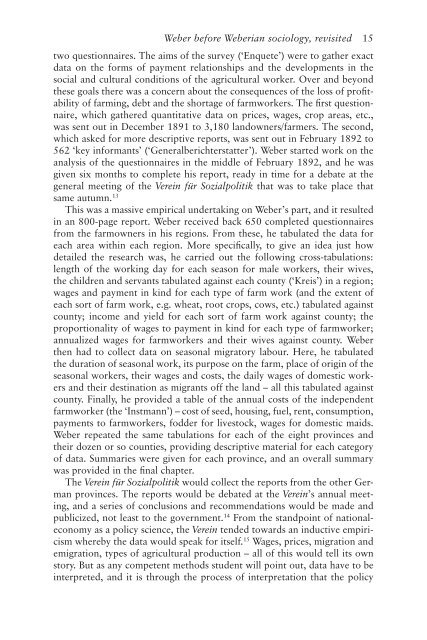Understanding Weber
Understanding Weber
Understanding Weber
You also want an ePaper? Increase the reach of your titles
YUMPU automatically turns print PDFs into web optimized ePapers that Google loves.
<strong>Weber</strong> before <strong>Weber</strong>ian sociology, revisited 15<br />
two questionnaires. The aims of the survey (‘Enquete’) were to gather exact<br />
data on the forms of payment relationships and the developments in the<br />
social and cultural conditions of the agricultural worker. Over and beyond<br />
these goals there was a concern about the consequences of the loss of profitability<br />
of farming, debt and the shortage of farmworkers. The first questionnaire,<br />
which gathered quantitative data on prices, wages, crop areas, etc.,<br />
was sent out in December 1891 to 3,180 landowners/farmers. The second,<br />
which asked for more descriptive reports, was sent out in February 1892 to<br />
562 ‘key informants’ (‘Generalberichterstatter’). <strong>Weber</strong> started work on the<br />
analysis of the questionnaires in the middle of February 1892, and he was<br />
given six months to complete his report, ready in time for a debate at the<br />
general meeting of the Verein für Sozialpolitik that was to take place that<br />
same autumn. 13<br />
This was a massive empirical undertaking on <strong>Weber</strong>’s part, and it resulted<br />
in an 800-page report. <strong>Weber</strong> received back 650 completed questionnaires<br />
from the farmowners in his regions. From these, he tabulated the data for<br />
each area within each region. More specifically, to give an idea just how<br />
detailed the research was, he carried out the following cross-tabulations:<br />
length of the working day for each season for male workers, their wives,<br />
the children and servants tabulated against each county (‘Kreis’) in a region;<br />
wages and payment in kind for each type of farm work (and the extent of<br />
each sort of farm work, e.g. wheat, root crops, cows, etc.) tabulated against<br />
county; income and yield for each sort of farm work against county; the<br />
proportionality of wages to payment in kind for each type of farmworker;<br />
annualized wages for farmworkers and their wives against county. <strong>Weber</strong><br />
then had to collect data on seasonal migratory labour. Here, he tabulated<br />
the duration of seasonal work, its purpose on the farm, place of origin of the<br />
seasonal workers, their wages and costs, the daily wages of domestic workers<br />
and their destination as migrants off the land – all this tabulated against<br />
county. Finally, he provided a table of the annual costs of the independent<br />
farmworker (the ‘Instmann’) – cost of seed, housing, fuel, rent, consumption,<br />
payments to farmworkers, fodder for livestock, wages for domestic maids.<br />
<strong>Weber</strong> repeated the same tabulations for each of the eight provinces and<br />
their dozen or so counties, providing descriptive material for each category<br />
of data. Summaries were given for each province, and an overall summary<br />
was provided in the final chapter.<br />
The Verein für Sozialpolitik would collect the reports from the other German<br />
provinces. The reports would be debated at the Verein’s annual meeting,<br />
and a series of conclusions and recommendations would be made and<br />
publicized, not least to the government. 14 From the standpoint of nationaleconomy<br />
as a policy science, the Verein tended towards an inductive empiricism<br />
whereby the data would speak for itself. 15 Wages, prices, migration and<br />
emigration, types of agricultural production – all of this would tell its own<br />
story. But as any competent methods student will point out, data have to be<br />
interpreted, and it is through the process of interpretation that the policy




